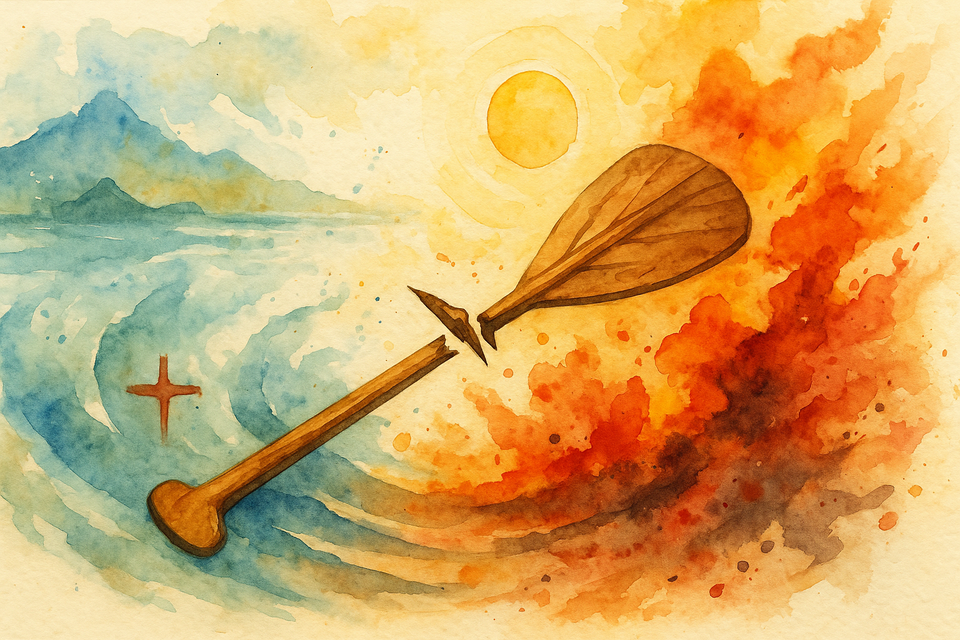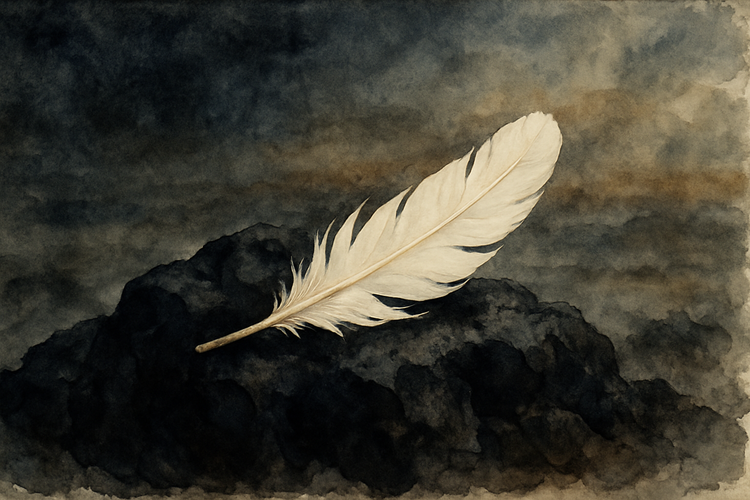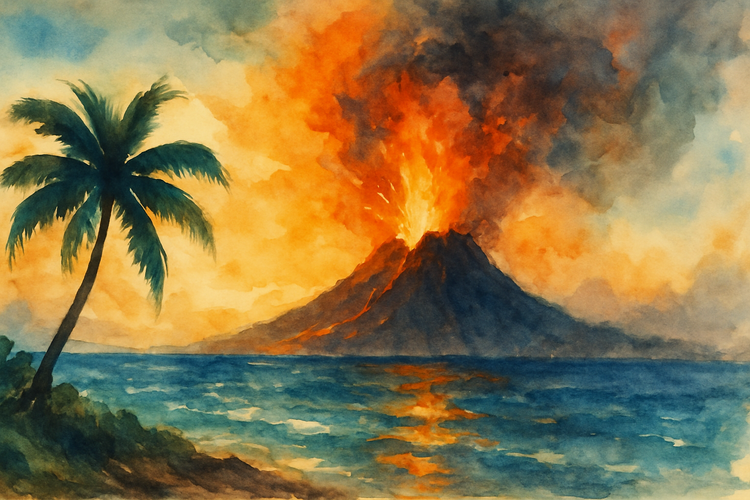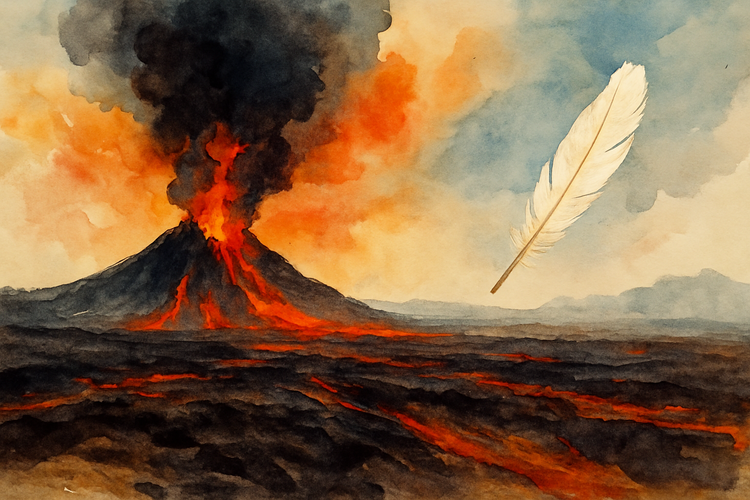Chief of War S1E6 "The Splintered Paddle"

Spoiler Warning: This reflection reveals events from the sixth episode of Chief of War.
Law in the Midst of Chaos
At the heart of The Splintered Paddle lies a stark question: can law tame chaos, or will chaos always seep through the cracks of power? This episode turns on that struggle, circling around Kamehameha’s attempt to codify peace even as fire, rebellion, and fractured loyalties erode the ground beneath him. Every figure we meet wrestles with the same divide: Keoua, burning the symbols of his father’s legacy in anger; Kahekili, lost in visions as his son pleads for order amid madness; Ka‘iana, disillusioned, asking whether faith belongs to gods or guns. Against this turmoil, Kamehameha dares to proclaim a law of peace — fragile, radical, and luminous — even as new dangers begin to gather at the island’s edges.
What the episode makes clear is that law is never abstract; it is born in fire, blood, and the will to imagine something different. Chaos, by contrast, is the easier path — rebellion against fathers, the intoxication of visions, the seductive promise of foreign weapons. Law asks for patience and restraint, for the sacrifice of vengeance. Chaos thrives on anger and immediacy, on the breaking of symbols and the spilling of blood. In The Splintered Paddle, these forces do not simply clash on battlefields — they live within each leader’s choices, within the bonds of family, and within the memory of a people trying to decide whether their future will be rooted in justice or consumed by rage.
Keoua’s Rebellion: Fire Against the Past
One of the first flashes of chaos comes when Keoua burns his father’s sacred headdress. On the surface, it is the act of an angry son lashing out at a legacy he no longer wishes to bear. Yet the gesture cuts deeper — an assault on memory itself, an attempt to unmake the strands of power and history woven into the feathered crown. Where Kamehameha seeks to bind his people to a new code, Keoua chooses fire, believing destruction can sever him from the weight of his father’s shadow. In this moment, personal rebellion spills outward into political fracture, a warning of how quickly private rage can destabilize the fragile order.
But Keoua’s fire is more than symbolic rage; it is the foundation of his politics. By desecrating the headdress, he declares that inheritance and tradition no longer bind him — that he will define authority through rupture, not continuity. His rebellion is thus not only against Kamehameha but against the very principle of law itself. Law seeks to build and preserve; Keoua seeks to break and unmake. The headdress becomes his manifesto, proof that anger has outstripped reason, and that he would rather enthrone chaos as his ally than risk being bound by a past that still holds power over him.
Kahekili’s Madness and a Son’s Resistance
If Keoua’s act of rebellion shows chaos ignited from below, Kahekili’s unraveling reveals the more unsettling truth: chaos can also seep from above. In O‘ahu, the king sits in a temple, drinking visions from a cup, half-entranced, half-lost to madness. Away from the temple, his son meets in the woods with a confidant who urges him toward revolution, insisting that a father so consumed by delusion can only be overthrown.
Yet the son resists. Unlike Keoua, who sought to erase his father’s legacy, Kahekili’s son longs to preserve it, clinging to the faint hope that reason might still reach a man already slipping into shadow. His resistance is quiet but telling: loyalty, even misplaced, can be its own fragile form of law, an attempt to hold continuity together when everything else is unraveling.
This contrast sharpens the episode’s meditation on order and disorder. Law requires memory and succession, leaders steady enough to safeguard them. Chaos does not need conquest to win; it only needs a father gone mad, a son torn between loyalty and survival, a kingdom with no center to hold. Kahekili’s visions blur the line between devotion and dereliction, showing how even the sacred can breed disorder when twisted too far. The Splintered Paddle reminds us that law cannot live on proclamations alone; it must be embodied in those who lead, and when those leaders falter, even love cannot shield a kingdom from collapse.
Ka‘iana, Guns, and the Faithless World Beyond
The meeting with Keoua sharpens the theme of fathers and sons into something wounding and raw. When Ka‘iana arrives with Kupuohi he is met with scorn. Keoua sneers at him, invoking the memory of Ka‘iana’s father — a man, he says, who would be ashamed of the son standing before him now, a son who clings not to gods or tradition but to the weapons of outsiders. The insult cuts deep, reminding us that rebellion and shame alike are carried through bloodlines. In Keoua’s voice, we hear not only the contempt of a rival but the echo of a father’s disappointment, wielded as a weapon more devastating than fire.
Out of that wound comes the introduction of the guns themselves. Tony, who knows full well what could be coming for these islands, demonstrates their use with chilling precision — how to load, aim, fire, reload. A deadly ritual stripped of prayer or offering, belonging to no altar but the battlefield. For warriors raised to see combat as inseparable from gods and sacrifice, the guns mark a rupture: power without sanctity.
When Ka‘iana finally mutters to Kupuohi, “There are no gods where I have been,” the line lands as both confession and warning. He has seen a world where violence is divorced from faith, where killing is not bound by law but driven by commerce and cruelty. If Keoua’s fire and Kahekili’s visions show how chaos corrodes from within, the guns reveal how it arrives from without — faithless, relentless, and immune to tradition.
The Splintered Paddle: Law as Vision and Gamble
Out of this storm of rebellion, madness, and foreign intrusion comes Kamehameha’s most radical act: the proclamation of a new law. Standing against the tide, he declares that people should live in peace, and that violence will be met with death unless it is in defense of one’s life. It is the Law of the Splintered Paddle — a principle so startling in its clarity that it feels almost impossible for the world it enters. In an age when vengeance is the common currency of power, Kamehameha dares to place justice above blood, restraint above rage.
The boldness of this moment lies not only in the words but in their context. Around him, chiefs are burning their fathers’ symbols, kings are lost in visions, guns are being placed into eager hands. The island is sliding toward chaos, and yet here stands a leader declaring peace as the foundation of order. To speak such a law is to insist that even amid scarcity and betrayal, a different path is possible. It is not the law of conquest, nor the law of gods alone, but the law of human dignity — a recognition that the weakest among them deserve protection rather than exploitation.
Here, the echoes of fathers and sons resound in a different key. Keoua destroyed his father’s headdress; Kahekili’s son grieves for a father slipping into madness. Against these ruptures, Kamehameha steps forward not merely as a warrior but as a father of his people, offering them protection where others have offered only fear. His law imagines a legacy not rooted in vengeance or the memory of bloodlines but in the survival of the common people. In this way, the Splintered Paddle becomes a counterpoint to the generational chaos unfolding around him: if sons cannot find peace with their fathers, perhaps a people might still find it with their king.
And yet, the proclamation is also fragile. It is not backed by overwhelming might, nor by the gods’ unquestioned authority, nor by a people unified in faith. It is backed only by Kamehameha’s conviction, and by the hope that others will see its wisdom before the chaos consumes them. The Splintered Paddle thus becomes both beacon and gamble: a vision of what order might look like, declared in defiance of a world already unraveling. Its brilliance is undeniable, but its survival is anything but assured.
The Agent of Chaos and the Gathering Storm
The declaration of peace does not still the chaos — it provokes it. Even as Kamehameha speaks of restraint and protection, Keoua, consumed by anger, sets out to find allies by any means necessary. His fury blinds him to caution, driving him directly to Kahekili’s side. But what he secures is no true partnership: Kahekili, half-lost to visions and calculation, offers him not stability but a poisoned gift. He sends a lunatic chief, a man defined by volatility, to command Keoua’s reinforcements. It is less an alliance than a pact with chaos itself, sealed by Keoua’s rage. Where Kamehameha seeks to restrain vengeance, Keoua actively embraces it, enthroning disorder as the engine of his cause.
And just as the islands’ rival chiefs set their pieces in motion, the horizon darkens further. At the very edge of the episode, the pale-skinned intruders arrive on the shore. They bring no gods and no law, only the violence Ka‘iana has already warned of, violence unmoored from faith and indifferent to justice. Their arrival makes plain what Ka‘iana’s haunted words already suggested: that the law Kamehameha proclaims must contend not only with the chaos of rebellion and madness within, but with an encroaching world where chaos itself is the order of things.
The closing image is thus one of fragile defiance. Kamehameha has set his vision into the world, daring to imagine that peace can be law even in an age of blood. Yet he stands surrounded — by Keoua’s rebellion, Kahekili’s madness, the seduction of foreign weapons, and the arrival of strangers whose power belongs to no god at all. The Splintered Paddle lingers in that tension, asking whether law can survive when conviction alone must hold against storms gathering from every side. It is less a resolution than a cliff’s edge, with Kamehameha’s law shining like a torch against a darkness that has only just begun to break.



Comments ()